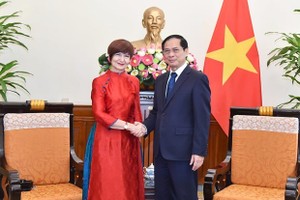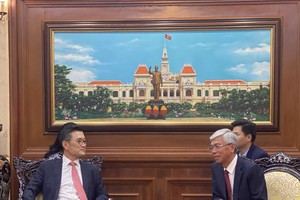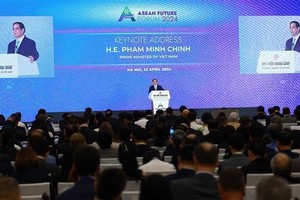Troubled US auto giants will square off against Chinese newcomers in Shanghai this week as they try to pull ahead in what has suddenly become the world's number one car market.
Despite seeking government life support at home, Ford Motor Company and General Motors Corp had banner months in China, which has overtaken the United States to be the world's largest auto market for three months running.
But Chinese manufacturers such as Geely and Chery also had strong months and, sensing blood in the water, they see a chance to break out as global names.
"The economic slowdown offers real opportunities for Chinese domestic car makers," said Klaus Paur, automotive director for research firm TNS China, ahead of Monday's start of the Shanghai international auto show.

Government incentives, such as tax rebates on smaller engine cars, helped drive China's auto sales to a monthly record of 1.08 million units in March.
Vehicle sales in the first quarter rose almost six percent from a year earlier to 2.64 million units, according to official figures.
Despite strong first quarter sales, 45 percent of prospective car buyers in China postponed purchases due to concerns over the economy, and a quarter have cut their budget, according to a TNS survey of more 1,000 mainland consumers.
These factors favour Chinese carmakers, who typically make cheaper vehicles than their foreign competitors, according to Paur.
"They can benefit from the cautious consumer behaviour and position themselves as attractive alternatives to foreign brands," he said.
Nevertheless, GM said it set a monthly sales record in China last month and has announced plans to double its annual sales here to two million units within five years.
"We're pretty well-placed to do a lot of growth at the moment without having to spend a lot of money," Kevin Wale, head of GM China Group told the Wall Street Journal last week.
Ford is also aggressively pushing forward in China, promoting cars such as its four-door Fiesta, which benefit most from Beijing's small engine rebates.
Meanwhile, their Chinese competitors are trying to gain a foothold on the US giants' traditional territory.
Independent Chinese carmakers Geely Automobile and Chery Automobile both plan massive displays built around their first American-style luxury sedans.
Geely will showcase its high-end "Emgrand" while Chery will tout its upmarket "Riich G6", which will initially be aimed at the Chinese market but which the makers hope eventually to sell in the United States and other developed countries.
"We've targeted the international stage from the very beginning," Chery said in a statement issued on Friday.
Chinese car makers are also set to showcase electric and hybrid cars as they seek to beat their US rivals on the environmentally friendly front at home and abroad.
However, despite Chinese automakers' bluster, a global brand has yet to emerge from the country's fragmented car industry, comprising more than 100 manufacturers, many propped up by regional governments.
The central government has repeatedly called for consolidation, but restructuring experts Alix Partners sum up the progress so far as "much hype and very little action".
Auto parts makers, which unlike car manufacturers often do not have government support, look shaky with more than 40 percent saying they fear severe liquidity problems and some may collapse, an Alix Partners study said.
Failing suppliers will have a knock-on effect on car makers, Alix Partners China managing director Ivo Naumann said.
"If your production process stops for one day because one of your suppliers can't deliver or went out of business you will have significant problems because you are incurring costs that are enormous," he said.
He predicted the industry consolidation would start with suppliers over the next 12 to 24 months.
























